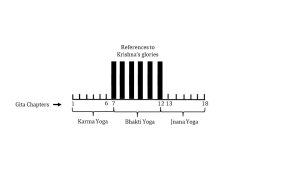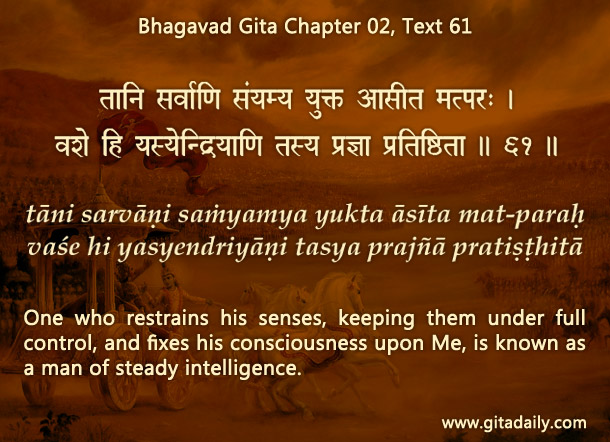 Some readers of the Bhagavad-gita ask, “Why does Krishna speak of his own glories so much throughout the Gita?”
Some readers of the Bhagavad-gita ask, “Why does Krishna speak of his own glories so much throughout the Gita?”
Actually, Krishna does not glorify himself throughout the Gita — his glories are prominent only in the Gita’s middle six chapters (7-12) and are brief in the remaining chapters. Why this difference?
Because Krishna is a focused teacher who sticks to the subject being discussed. The Gita’s middle six chapters deal with bhakti-yoga, which can’t be explained without stressing the worthiness of the object of devotion. If we are to follow a process meant to become devoted to someone, we need to be convinced about that person’s glories. Thus, it is to complete his explanation of bhakti-yoga that Krishna speaks about his glories extensively.
Krishna’s purpose becomes clear if we consider the Gita’s first six chapters that deal with karma-yoga and its last six chapters that deal with jnana-yoga. While describing these processes, Krishna focuses primarily on the relevant concepts such as detachment in the first six chapters or discernment in the last six. Though Krishna is the ultimate purpose of all yoga processes, he is not the focus of the seeker’s consciousness when they practice karma-yoga or jnana-yoga. That’s why Krishna hardly ever refers to himself in these chapters. Whenever explaining those processes requires a mention of his special position, Krishna does so briefly before quickly moving on to explaining the process itself. For example, in the entire second chapter, which is among the Gita’s longest chapters, Krishna refers to his special position only once (02.61). And that mention is meant to complete his discussion on sense control — to succeed, we need to not just restrain our senses, but also redirect them toward Krishna, who as the all-attractive supreme can offer supreme satisfaction to our senses.
Thus, a careful reading of the Gita shows how Krishna is a sound teacher, not a self-glorifier.
One-sentence summary:
Krishna’s purpose is not his own glorification but our holistic education — he speaks of his glories only when they contribute to his explanation of the process being taught.
Think it over:
- How are Krishna’s glories distributed in the Gita?
- Why are his glories prominent in the Gita’s middle six chapters?
- Why are his glories brief in the Gita’s remaining chapters?
***
02.61: One who restrains his senses, keeping them under full control, and fixes his consciousness upon Me, is known as a man of steady intelligence.
To know more about this verse, please click on the image


Leave A Comment